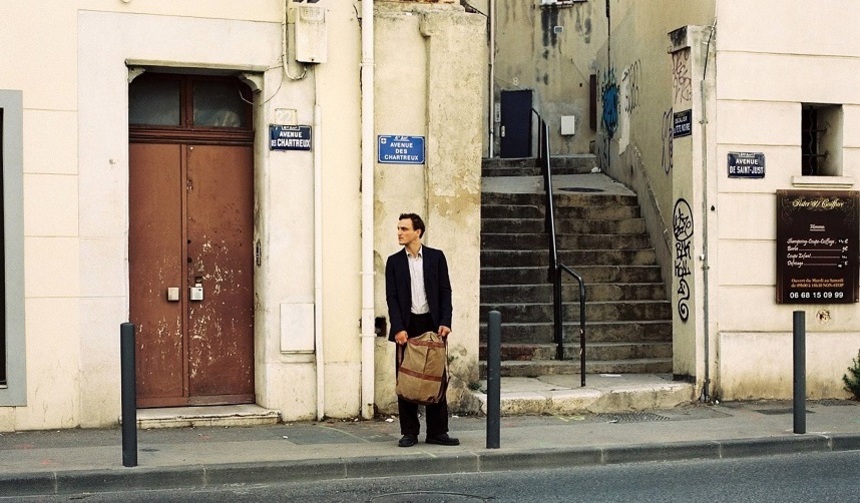Melbourne 2018 Review: TRANSIT Disorients and Compels as Unique Wartime Noir
Christian Petzold’s Berlin Film Festival Golden Bear Contender Stars Franz Rogowski and Paula Beer in an unforgettable adaptation.

Director Christian Petzold’s (Phoenix) unique adaptation of the same name brilliantly twists the time and place of World War II events. The decision to depict a War narrative in this way disorients the viewer as there is no exposition to what is initially happening. In Transit a fascist occupation (implied Nazis) of France is transported to modern day, although things feel regressive and out of place. There are, for example, no facets of technology humanity has come to rely on, no safety net, and nowhere to hide.
A man, Georg (Franz Rogowski) is hired to transport a writer, his travel documents, and controversial novel from Paris to Marseilles. When he realizes the writer has already committed suicide he takes his belongings and by happenstance assumes the identity of the writer. Approved by the Mexican Consulate he must wait for the next boat leaving for Mexico as the fascists move closer to taking over.
Georg’s time in Marseilles feels like purgatory, as the days pass and time ticks on, both uncanny and convenient things happen as the threat of invasion looms. Georg resides in a run-down hotel, filled with German-Jewish refugees, some of which he has some peculiar run-ins with. He meets a refugee mother and son, both illegals planning to flee across the mountains and builds a strangely quick relationship with the boy who sees Georg as a father figure. Through that connection Georg also meets a Paediatrician Doctor, Richard (Godehard Giese) who is eager to leave for Mexico so he can start practicing and helping others again. Then there is the mysterious woman Marie (Paula Beer) that seems to appear everywhere Georg finds himself. All the while a narrator beautifully describes scenes and the internal monologue of Georg, it is not revealed until later just who this narrator is.
There is a lingering and dangerous mystery that pierces every scene of Transit. It is a bewildering feeling that captures the essence of a War narrative, but also the plight of refugees. The crisis of sovereignty and basic rights being taken away, a loss of identity and self that is reflected sharply in a few characters, especially Georg. There is a calm before the storm and a feeling of entrapment, as nobody can actually safely leave, not yet. The sun baked streets of Marseilles are accompanied by a lurching shadow on every wall. Everything is low-key and tension fills the air. The Raid police squad are an ever-present threat, but so is frustrating red tape and bureaucracy.
The quiet sullen faces of the survivors depict a suffering, shame and burden that is reflected on Georg, someone trying to atone and selflessly act throughout the film. There is a desperate anguish that is conveyed beautifully and painfully by Franz Rogowski as Georg. The dislocation is a trauma that has worn him down, his repeat visits to the same café for the same meal, and wanderings through the streets and to the consulates paint him as a flaneur; a unique wanderer, observing the place he does not belong, watching his people and tuning out their stories of survival and horror as his own existential crisis deepens.
Another type of mystery keeps him alive in Transit, an alluring femme fatale type that initially haunts and provokes Georg with coincidental encounters as she comes and goes, frantically searching for something. When he finally meets her proper, his desires and guilt provokes a fateful decision as the days to safely depart dwindle, and all the encounters he has had whilst in Marseilles come to bear.
Transit is yet another beautiful film from Christian Petzold, only he can depict such melodrama artfully, and like Phoenix this is a unique take on war-time narratives. Although Transit does not have a jaw-dropping conclusion like Phoenix did, it does conclude the journey in a quietly powerful way, essentially a slow-burn leading up to the day the boat is set to depart.
The artful use of the narrator is a perfect tool that offers not exposition, but enhances the key moments with romantic descriptions of desperate times and broken people. Thus Transit is literature, heightened by the beautiful prose and highly thought-provoking, this is a beautifully told noir. One that is carried by one of the best performances of the year as Franz Rogowski depicts this extremely complex character in an unforgettable way.







